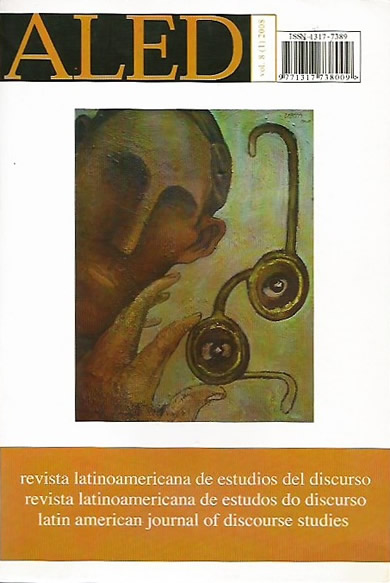Estratégias de (im)polidez em interações acadêmicas virtuais
Mots-clés :
(im)polidez. domínio discursivo. discurso acadêmico.Résumé
Este trabalho busca discutir o conceito de polidez a partir de uma perspectiva interacionista, utilizando, como base para a reflexão, dados de dois gêneros acadêmicos, aulas chat e listas de discussão. Contrapondo-se a uma postura comum nos trabalhos seminais sobre o tema, postula que a análise não deve fixar-se nos enunciados, mas nos comportamentos dos interactantes, isto é, não é o enunciado que é (im)polido, mas, antes, são as pessoas que interpretam os enunciados como tendo diferentes graus de polidez. Assim, é fundamental tentar identificar os fatores que influenciam as percepções, percepções essas que são dinâmicas, dos interlocutores a respeito do fenômeno.
Téléchargements
Références
BATESON, G. (1972). ‘A theory of play and fantasy?’, in: G. Bateson Steps to anEcology of Mind, pp. 177-193. New York: Chandler.
BROWN, P. & LEVINSON, S. (1987). Politeness. Some Universals in Language Usage.Cambridge: CUP.
FRASER, B. & NOLAN, W. (1981). ‘The association of deference with linguisticforma’, in: J. Walters (ed.) The Sociolinguistics of Deference and Politeness,pp. 93 - 109. The Hague: Mouton.
GOFFMAN, E. (1974). Frame Analysis. New York: Harper & Row.GUMPERZ, J.J. (1977). ‘Sociocultural knowledge in conversation inference’, in:M. Saille-Troike (ed.), Linguistics and Anthropology. Georgetown Round Table on Languages and Linguistics, pp.191-211. Washington, DC: George-town University Press.GU, Y. (1990). ‘Politeness phenomena in modern Chinese’, Journal of Pragma-tics, 14 (2): 237 ”“ 257.
IDE, S. (1993). ‘Formal forms and discernement: two neglected aspects of uni-versals of linguistics politeness’, Multilingua, 8 (2/3): 223 ”“ 248.
LEECH, G. (1983). Principles of Pragmatics. London: Longman.LEECH, G. (2005). ‘Politeness: Is there an East_West Divide?’, Journal of ForeignLanguage, 6: 1004 ”“ 5139.
LOCHER, M. & WATTS, R. (2005). ‘Politenss theory and relational work’, Journalof Politeness Research, 1: 9 ”“ 33.
MAO, L.R. (1994). ‘Beyond politeness theory: “Face” revisited and renewed’,Journal of Pragmatics, 21: 403 ”“ 426.
SPENCER-OATEY, H. (2000) ‘Rapport management: A framework for analysis’,in: H. Spencer-Oatey (ed.) Culturally Speaking. Managing Rapport throughTalk across Cultures, pp. 11 ”“ 46. London: Continuum.
SPENCER-OATEY, H. (2005). ‘(Im)politeness, face and perceptions of rapport:Unpackaging their bases and interrelationships`, Journal of PolitenessResearch, 1: 95 ”“119.
TANNEN, D. e WALLAT, C. (1987). ‘Interactive frames and knowledge schemas ininteraction: Examples from a medical examination / interview’, Social Psychology Quaterly 50, 2: 205-216.WATTS, R. (2003). Politeness. Cambridge: Cambridge University Press.
WIERZBICKA, A. ([1991] 2003). Cross-cultural Pragmatics: the Semantics of Human Interaction. Berlin: Mouton.
Téléchargements
Publié-e
Comment citer
Numéro
Rubrique
Licence

Cette œuvre est sous licence Creative Commons Attribution - Pas d'Utilisation Commerciale - Pas de Modification 4.0 International.
Los/as autores/as conservan los derechos de autor/a y garantizan a RALED el derecho de ser la primera publicación del trabajo al igual que licenciado bajo una Creative Commons Attribution License BY-NC-ND 4.0 que permite a otros compartir el trabajo con un reconocimiento de la autoría del trabajo, copiar y redistribuir el material en cualquier medio o formato.
Os/As autores/as conservam os direitos autorais e garantem a RALED o direito de ser a primeira publicação do trabalho licenciado por uma Creative Commons Attribution License BY-NC-ND 4.0 que permite compartilhar o trabalho com reconhecimento de sua autoria e cópia e redistribuição do material em qualquer meio ou formato.




